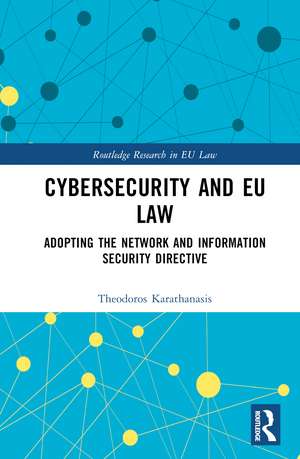Cybersecurity and EU Law: Adopting the Network and Information Security Directive: Routledge Research in EU Law
Autor Theodoros Karathanasisen Limba Engleză Hardback – 22 noi 2024
Combining insights from law and political science, the book offers a comparative empirical analysis of national policies and regulations regarding network and information security, as well as the national legal framework deriving from the NIS Directive’s transposition. The book argues that the more the Directives offer a regulatory leeway to EU Member States for the transposition of their content, the more the preservation of national interests by EU Member States affects the uniform application of directives across the EU. Highlighting the need to go beyond the study of the legal compliance of European directives, the volume offers a new perspective on the interests of Member States and European law, bridging the gap between the politics and law of European integration.
It will be of interest to students, academics, and practitioners with an interest in EU Law and cybersecurity.
Din seria Routledge Research in EU Law
-
 Preț: 350.84 lei
Preț: 350.84 lei -
 Preț: 359.67 lei
Preț: 359.67 lei -
 Preț: 326.49 lei
Preț: 326.49 lei - 18%
 Preț: 1007.36 lei
Preț: 1007.36 lei - 18%
 Preț: 1057.13 lei
Preț: 1057.13 lei - 18%
 Preț: 1069.71 lei
Preț: 1069.71 lei - 28%
 Preț: 820.73 lei
Preț: 820.73 lei - 26%
 Preț: 763.95 lei
Preț: 763.95 lei - 14%
 Preț: 300.29 lei
Preț: 300.29 lei - 26%
 Preț: 847.73 lei
Preț: 847.73 lei - 12%
 Preț: 299.87 lei
Preț: 299.87 lei - 12%
 Preț: 299.52 lei
Preț: 299.52 lei - 12%
 Preț: 299.52 lei
Preț: 299.52 lei - 18%
 Preț: 1001.84 lei
Preț: 1001.84 lei -
 Preț: 373.43 lei
Preț: 373.43 lei -
 Preț: 414.39 lei
Preț: 414.39 lei -
 Preț: 468.41 lei
Preț: 468.41 lei - 12%
 Preț: 300.09 lei
Preț: 300.09 lei -
 Preț: 391.39 lei
Preț: 391.39 lei - 14%
 Preț: 300.49 lei
Preț: 300.49 lei - 18%
 Preț: 1068.91 lei
Preț: 1068.91 lei -
 Preț: 192.05 lei
Preț: 192.05 lei -
 Preț: 416.22 lei
Preț: 416.22 lei - 12%
 Preț: 299.45 lei
Preț: 299.45 lei - 18%
 Preț: 997.90 lei
Preț: 997.90 lei - 18%
 Preț: 996.96 lei
Preț: 996.96 lei -
 Preț: 436.14 lei
Preț: 436.14 lei - 31%
 Preț: 762.97 lei
Preț: 762.97 lei -
 Preț: 404.24 lei
Preț: 404.24 lei - 18%
 Preț: 707.10 lei
Preț: 707.10 lei -
 Preț: 281.24 lei
Preț: 281.24 lei - 18%
 Preț: 1057.89 lei
Preț: 1057.89 lei - 18%
 Preț: 1119.87 lei
Preț: 1119.87 lei - 25%
 Preț: 825.62 lei
Preț: 825.62 lei
Preț: 1004.72 lei
Preț vechi: 1225.28 lei
-18% Nou
Puncte Express: 1507
Preț estimativ în valută:
192.28€ • 199.100$ • 158.74£
192.28€ • 199.100$ • 158.74£
Carte tipărită la comandă
Livrare economică 15-29 aprilie
Preluare comenzi: 021 569.72.76
Specificații
ISBN-13: 9781032614458
ISBN-10: 1032614455
Pagini: 288
Dimensiuni: 156 x 234 mm
Greutate: 0.58 kg
Ediția:1
Editura: Taylor & Francis
Colecția Routledge
Seria Routledge Research in EU Law
Locul publicării:Oxford, United Kingdom
ISBN-10: 1032614455
Pagini: 288
Dimensiuni: 156 x 234 mm
Greutate: 0.58 kg
Ediția:1
Editura: Taylor & Francis
Colecția Routledge
Seria Routledge Research in EU Law
Locul publicării:Oxford, United Kingdom
Public țintă
Academic and PostgraduateCuprins
1. Introduction
2. The Cybersecurity Rulemaking of the EU: Moving from Soft Law to Hard Law
3. The NIS Directive: A Hard Instrument with a Soft Dimension
4. Framing the Assessment of the Effectiveness of the Transposition of the NIS Directive
5. Case Studies Comparative Analysis I, Transposing the NIS Directive
6. Case Studies Comparative Analysis II, The Impact of Domestic Factors
7. Conclusion
2. The Cybersecurity Rulemaking of the EU: Moving from Soft Law to Hard Law
3. The NIS Directive: A Hard Instrument with a Soft Dimension
4. Framing the Assessment of the Effectiveness of the Transposition of the NIS Directive
5. Case Studies Comparative Analysis I, Transposing the NIS Directive
6. Case Studies Comparative Analysis II, The Impact of Domestic Factors
7. Conclusion
Notă biografică
Theodoros Karathanasis is a Research Fellow at the Chair on the Legal and Regulatory Implications of Artificial Intelligence (Multidisciplinary Institute on Artificial Intelligence (MIAI) – University of Grenoble Alpes (UGA), France) and attached to the Centre for International Security and European Cooperation Studies (CESICE). He holds a PhD in European law from the UGA. He is a member of both the cyber experts’ network of the European Centre of Excellence for Combating Hybrid Threats (HybridCoE) and the EU CyberNet.
Descriere
This book explores the effects of the Network and Information Security Directive upon EU governance of cybersecurity. It analyses the impact of constraining factors originating from NIS-related domestic policies across various European nations. It will be of interest to researchers with an interest in EU Law and cybersecurity.
